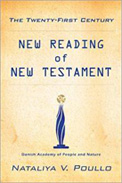"No matter if we are believers or not, we all know the name of Jesus Christ.... However what do we really know about what happened that time in Jerusalem?"

 |
The Twenty-First Century: New Reading of New Testament by Natalyia V. Poullo Trafford Publishing
book review by Jana McBurney-Lin
Poullo grew up with questions about Christian scripture. Why did Mary give birth in a stable? Why was the thief Judas entrusted with money? Why did Mary Magdalene Jesus' tomb alone? Nothing was written about Jesus until 60 AD and the stories were passed by unreliable word of mouth. However, based on what's written, the "virgin birth" is a myth created so that the child of Mary would have the same royal status as she did. Apparently, Mary was one of the remaining royalty from the House of David. The reason Mary gave birth in a stable was for her safety. The "angels" who directed the Three Wise Men were people close to the royal family interested in learning if there was a new king.
This new king had dreams and could hypnotize people, which he did on a routine basis. Puollo likens him to Wolf Messing, a man who during WWII routinely predicted the future and was wanted by Nazis and the Russians alike. Judas and Mary Magdalene were of the same social strata as Jesus. Judas, according to legend, was raised by a queen of an island. For his skill and beauty, Judas became responsible for palace finances. For Jesus, he was entrusted with the common money bag. Puollo believes the other disciples (especially Peter, another business genius) were jealous and thus created the betrayal story.
According to Puollo, when Jesus was crucified and a miracle didn't occur, Mary manufactured one. Alone at the tomb, she had people move the body and invents the story. Businessman Peter catches wind of this. Peter—who had a revulsion toward women—is responsible for setting up the church the way it remains today, a priestly brotherhood with no women included.
Puollo posits that the Bible is just a story that, unfortunately, people will fight to the death over. Her narrative—despite typos and grammar erors—has a snappy, teacherly style, but without supporting documentation, her theories become another fascinating story.